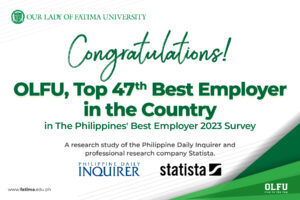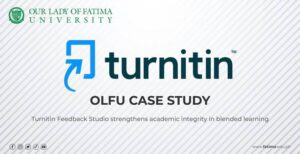The COVID-19 pandemic has challenged many aspects of society and one of those is education— how can learning continue when the conventional classroom format is disrupted, especially in a country like the Philippines? The effects of the global crisis were surprisingly severe; yet, with the help of technology, citizens kept on collaborating through alternative opportunities. The education sector still stands; learning must continue but in the safest way possible.
On 09 June 2020, Our Lady of Fatima University (OLFU) President, Dr. Caroline Marian S. Enriquez shared her knowledge and expertise as a leader of the academe at the webinar entitled “The COVID-19 Pandemic Reshaping Education”, hosted by the American Chamber of Commerce of the Philippines, Inc. (AmCham) North Luzon in partnership with PLDT Enterprise.
Dr. Enriquez led a discussion on “The Triple Shock and the Opportunities Ahead” wherein she named three major upsets to the education sector in this time of pandemic: School Closures and the Economic Crisis, the “twin shocks” first identified by World Bank’s Jaime Saavedra; and Long-run Costs to Education.
“Never did we experience anything as deep and as uncertain as this pandemic,” she said, recognizing the drastic effects of the novel coronavirus on a global scale. “The protracted and uncertain quarantine period that has been implemented to fight the pandemic is generating one of the deepest secessions in history, and affecting many children and young adults, especially those coming from a low-income class.”
In analyzing the “shocks”, Dr. Enriquez posed the question, “How then do we mitigate the shocks to the educational system and to the human capital and economy of the Philippines?”
As the incumbent President of the Philippine Association of Colleges and Universities (PACU) and Vice Chairperson of the Coordinating Council of Private Educational Associations (COCOPEA), Dr. Enriquez likewise shared the organizations’ initiatives in helping the Philippine education sector to adapt. PACU and COCOPEA have collaboratively submitted several position papers and engaged in dialogues with the Department of Education (DepEd), the Commission on Higher Education (CHED), and the Inter-Agency Task Force on Emerging Infectious Diseases (IATF).
To her fellow educators, she then gave three key points that must be considered in the shift to The New Normal— GCQ, which stands for Groundwork, Continuity of Education, and Quality Assuring Education.
On Groundwork, Dr. Enriquez emphasized the importance of meticulously planning ahead for various aspects such as communication with stakeholders, the delivery of lessons, preparation of learning resources, and health and safety protocols. “Every one of us has to be agile and flexible. We have to have different iterations of our plans because of the uncertainties of the times,” she asserted.
Following this, Dr. Enriquez also stressed that Continuity of Education must also be ensured through strengthened communication with parents and students, steady assessment and improvement of services, increased accessibility to various educational resources, enhancement of teacher trainings, and consistent health and wellness monitoring. Schools’ readiness for transitioning to different modalities of learning determined by the current situation is essential and clear policies on this must be established.
Lastly, on Quality Assuring Education, Dr. Enriquez said: “The New Normal is not clear; we don’t know what things will happen, how education will be like a few months from now or even for the next year. It will not be normal, but one thing is for sure: we all have to consider increasing our investments in technology to supplement or enhance education.” The esteemed educator urged her audience to consider the allocation of resources for online learning investments and realignment of available student services given the current norm. She also called for the reinforcement of institutional continuity plans, underlining the importance of planning for the future in response to changes that may come.
Dr. Enriquez closed her talk with powerful words: “We have to overcome fear, and enhance and build on our resilience. Mostly, we have to build better on what we have now.”
Attended by roughly around 300 educators in different parts of the country, the AmCham webinar featured a lineup of respected leaders and experts from the education and business sectors. Dr. Luis Maria R. Calingo, President of Holy Angel University, had an insightful talk on how COVID-19 is reshaping education in the country by thoroughly answering three concerns/ issues: (1) on postponement of classes until there is a vaccine, (2) on the delivery of education during the pandemic, and (3) on strategic actions and changes that schools and organizations will undertake in the post-pandemic recovery phase. He likewise presented three strategic models that colleges and universities may consider: (1) Augmented Residential Model, (2) Hybrid Education, or (3) Purely Online College.
Dr. Maria Teresita M. Semana, CESO IV, Officer-in-Charge Regional Director of the CHED Regional Office III (CHEDRO III), on the other hand, shared the initiatives of the Commission and the projects identified by her Office moving forward.
Benedicto Perez, Customer Relationship Management Head of FMCG, Academe, Transport & Logistics, PLDT Enterprise also shared insights through his talk on the “Role of Technology in Transforming Education.” He likewise presented solutions that his company has been working on to provide better and wider access to online learning in the country.
AmCham’s Executive Director Ebb Hinchliffe was also present to give a few words to the audience, while Dr. Frankie Villanueva moderated the talks.
Throughout the program, members of the audience were given the chance to ask questions, which allowed the speakers to talk more about their best practices in their respective institutions.
There is still a gap between the problem and solution, but learning opportunities such as this event provide a better understanding of the situation and allow stakeholders to weigh in the possibilities; hence, learning brings people one step closer to finding an answer, and it must continue.
Photo Credits: AmCham North Luzon and PLDT Enterprise



